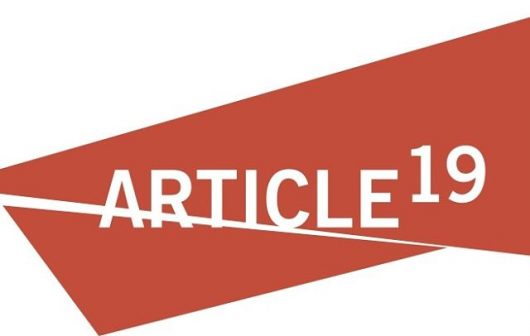Article 19 Defends Freedom of Expression and Information
 The United Nation’s Universal Declaration of Human Rights states in article 19 that “everyone has the right to freedom of opinion and expression; this right includes freedom to hold opinions without interference and to seek, receive and impart information and ideas through any media and regardless of frontiers.”
The United Nation’s Universal Declaration of Human Rights states in article 19 that “everyone has the right to freedom of opinion and expression; this right includes freedom to hold opinions without interference and to seek, receive and impart information and ideas through any media and regardless of frontiers.”
Named after this assertion, Article 19 is a human rights organization whose mission is to protect the freedom to speak globally. The group has worked in many different nations to address censorship, access to information and equality and hate speech, among other subjects.
Founded in 1987, Article 19 is based in London but has regional offices throughout the world, working with 100 organizations in more than 60 countries. The organization protects free speech on a global level by lobbying governments, intervening in individual incidents of rights violations and shaping legal standards relating to media and access to information.
With a commitment to combatting censorship, Article 19 has advocated on behalf of journalists arrested in Gambial, as well as Tanzanian politicians imprisoned for insulting the president. It has launched a petition that calls for a binding agreement for Latin American and Caribbean governments to guarantee access to information and justice in environmental matters, asserting that openness and transparency can help to monitor political corruption.
The organization has also written on the need for hate speech to be addressed in Myanmar and has taken a stance on racial discrimination in Tunisia, stating that racism inhibits pluralism of voices. Article 19 is a founding member of the International Freedom of Expression Exchange, a global network of 119 organizations committed to defending the basic liberty of freedom of expression. The nongovernmental organization raises awareness, acts through advocacy coalitions, forms petitions and conducts conferences and workshops.
Article 19 is also a founding member of the Freedom of Information Advocates Network, a group connecting organizations and individuals promoting access to information. The coalition runs projects such as a discussion list of lawyers, academics and civil society representatives concerned with the right of access.
In March 2017, Article 19 participated in a session of the U.N. Human Rights Council to draft The Global Principles on Freedom of Expression and Privacy, a document that will protect the openness of the media and safeguard the liberties of individuals and organizations internationally. The document is intended to inform policy makers and legislators in navigating liberties online and offline.
The Global Principles on Freedom of Expression and Privacy affirms the right of individuals to exercise freedom of expression anonymously and to use secure communication tools, while calling for the regulation of mass surveillance, describing this practice as interfering with privacy and freedom of expression. Additionally, the plan calls for the protection of confidential information given to companies online, as well as the right for confidential journalistic sources to not be disclosed. Through these measures, The Global Principles on Freedom of Expression and Privacy safeguard fundamental liberties in light of the digital age.
Article 19 is taking a stand against political censorship, the spreading of misinformation and the challenges that journalists face across multiple countries, calling for greater transparency and accountability. The organization operates on an international level, envisioning a world where freedom of expression and information are held in value. Navigating the digital era and the dangers of an oppressed media presence, Article 19 continues to fight for a diverse global community of voices, intervening in cases across the world and engaging in policy work to advance human rights.
– Shira Laucharoen
Photo: Google
